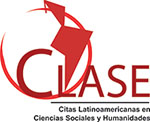El aprendizaje cooperativo como una estrategia de enseñanza del Idioma de Ingles en las Escuelas píºblicas del Ecuador
DOI:
https://doi.org/10.23857/dc.v4i3.817Palabras clave:
aprendizaje cooperativo, idioma inglés, educación pública y estudiantes.Resumen
El aprendizaje cooperativo, es una estrategia de gran motivación para lograr el aprendizaje de otro idioma. Bajo esta noción, se presenta este artículo cuyo objetivo es proponer actividades de aprendizaje cooperativo para los maestros que trabajan en las Escuelas Píºblicas Ecuatorianas en pro de motivar en los estudiantes el aprendizaje del inglés. Para ello, se utilizó un enfoque mixto cuali-cuantitativo. La población la constituyeron los estudiantes del octavo año de educación bósica de las escuelas píºblicas ecuatorianas de la provincia de Tungurahua y cuya muestra fue de 32 estudiantes y 3 profesores de inglés. El instrumento aplicado fue una encuesta de 10 preguntas, cuyas alternativas de repuestas fueron Sí / No y opción míºltiple, el anólisis de la información obtenida permitió concluir que los profesores de inglés de las Escuelas Píºblica Ecuatoriana investigadas no aplicaban actividades de aprendizaje cooperativo en sus clases, preferían el trabajo individual para facilitar la evaluación y hacer comentarios individuales sobre la estructura de la gramótica y el uso del vocabulario.
Citas
Aroca, W. B., Guevara Salazar, Y. E., Hermosa Tovar, J. A., & Moreno Solano, J. L. (2009, November 24). Educación, Tecnología. Retrieved from https://es.slideshare.net/guest7f1ad678/cooperative-language-learning
Darvishi (2013). Application of Cooperative Learning. Recuperado en:
https://www.researchgate.net/.../275537643_Application_of_Coo.
Devlin, N. (2001). Leaf Group Ltd English Language. Retrieved from http://classroom.synonym.com/classroom-activities-cooperative-learning-7916223.html
Gillies, R. M., Ashman, A., & Terwel, J. (2008). Social Interdependence Theory and Cooperative Learning: The Teacher's Role. New York: Springer Science+Business Media LLC, 233 Spring Street New York.
Halili, D. J. (2013, April 15). Education. Retrieved from https://es.slideshare.net/DenLynHalili/cooperative-language-learning-18854783
Hidalgo (2017). Panorama. Recuperado en: https://www.researchgate.net/.../Panoramas-de-la-enseñanza-de-las-lenguas-extranjeras.
Johnson, D. W., Johnson, R. T., & Smith, K. A. (2013). Cooperative Learning: Improving University Instruction by Basing Practice On Validated Theory. Journal on Excellence in University Teaching, 26.
Masoud Azizinezhad, Hashemi, M., & Darvishi, S. (2013). Application of cooperative learning in EFL classes to enhance the the Students’ Language Learning. Procedia - Social and Behavioral Sciences, 138-141.
Norman, L. (2013, 12 31). Bright Hub Education. Retrieved from http://www.brighthubeducation.com/esl-teaching-tips/99116-using-cooperative-learning-in-your-esl-class/
Sosnowski, J. (2001). Leaf Group Ltd. English Language. Retrieved from http://classroom.synonym.com/three-disadvantages-using-cooperative-learning-10044274.html
(http://www.colorincolorado.org/article/cooperative-learning-strategies).
Publicado
Cómo citar
Número
Sección
Licencia
Authors retain copyright and guarantee the Journal the right to be the first publication of the work. These are covered by a Creative Commons (CC BY-NC-ND 4.0) license that allows others to share the work with an acknowledgment of the work authorship and the initial publication in this journal.







